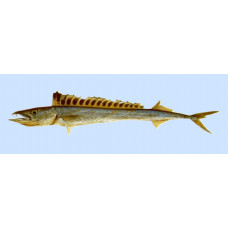Latin name
Thyrsitoides marleyi
Other name
Black snoek
Identification
It is the only member of the genus Thyrsitoides, making the genus monotypic.
The black snake mackerel has 34 vertebrae. Two lateral lines originating above the upper corner of the gill aperture and branching below or slightly behind the 4th dorsal fin, the upper line running along the base of the first dorsal fin and terminating below, approximately at the end of the first dorsal fin, the lower line curving sharply backwards from the bifurcation and running medially from the sides to the base of the middle ray of the caudal fin.
Features of fish fins
Dorsal spines (total): 17 - 19; Dorsal soft rays (total): 16 - 17; Anal spines: 1; Anal soft rays: 16 - 17.
Fish colouring
Body colour dark brown with slight metallic highlights, sometimes slightly lighter on the belly. Dorsal fin webs with black markings.
Distribution
Widespread in the Indo-West Pacific: from the Red Sea to South Africa and New Caledonia, northwards to Japan. Recently reported from Tonga.
Habitat
A deep-sea benthopelagic species. Occupies shallow waters to depths of at least 400m (1,300ft), apparently preferring the slopes of seamounts and ridges.
Size
This species reaches a total length of 2m, although most are around 1m.
Behavior
Black snake mackerel are known to make long vertical migrations at night to near-surface waters.
Food and feeding habits
Feeds on a variety of mesopelagic fish, squid and crustaceans.
Reproduction
The breeding biology of the black snake mackerel is not yet understood.
Fishing
This species is of minor importance to the local commercial fishery.
Relationship with a person
Harmless.
| Classification | |
| Phylum | Chordata |
| Class | Actinopterygii |
| Squad | Scombriformes |
| Family | Gempylidae |
| Genus | Thyrsitoides |
| Species | T. marleyi |
| Features | |
| Conservation status | Not Evaluated |
| Habitat | Pelagic |
| Life span, years | No information |
| Maximum body weight, kg | No information |
| Maximum length, cm | 200 |
| Sailing speed, m/s | No information |
| Threat to people | Edible |
| Way of eating | Predator |
Blacksail snake mackerel
Tags: blacksail snake mackerel

